小学英语四年级下册
(完整版)PEP小学四年级下册英语课文及翻译

PEP四年级下册英语课文及翻译Unit 1 Our schoolA Let’s learnplayground操场library图书馆teacher’s office 教师办公室garden花园canteen食堂Where is the canteen?食堂在哪里?It’s on the first floor.它在一楼。
Let’s doGo to the garden. Water the flowers.Go to the library. Read a story-book.Go to the cinema. Eat some noodles.Go to the teacher’s office. Hand in your homework.Go to the playground. Play football.Let’s talkChen: Welcome to our school! 欢迎来我们的学校。
This is the teacher’s office.这是教室办公室。
That is my classroom.那是我的教室。
Visitor: How many students are there in your class?你们班有多少个学生?Chen: Forty-five.四十五。
Visitor: Do you have a library?你们有图书馆吗?Chen: Yes.Visitor: Do you have lunch at school?你们在学校吃午饭吗?Chen: Yes! The canteen is on the first floor. This way , please.是的。
食堂在一楼。
这边请。
Look! This is our playground.看!这是我们的操场。
Visitor: Oh! Your school is beautiful.哦!你们的学校很漂亮。
(完整word版)PEP小学四年级下册英语课文及翻译

PEP四年级下册英语课文及翻译Unit 1 Our schoolA Let's learnplayground 操场library 图书馆teacher's office 教师办公室garden花园canteen 食堂Where is the canteen?食堂在哪里?It’s on the first floor.它在一楼.Let’s doGo to the garden。
Water the flowers。
Go to the library. Read a story-book。
Go to the cinema. Eat some noodles。
Go to the teacher’s office。
Hand in your homework.Go to the playground。
Play football.Let's talkChen: Welcome to our school!欢迎来我们的学校.This is the teacher’s office。
这是教室办公室。
That is my classroom. 那是我的教室。
Visitor: How many students are there in your class?你们班有多少个学生?Chen: Forty-five。
四十五.Visitor: Do you have a library? 你们有图书馆吗?Chen: Yes。
Visitor: Do you have lunch at school?你们在学校吃午饭吗?Chen: Yes! The canteen is on the first floor。
This way , please.是的。
食堂在一楼。
这边请。
Look! This is our playground。
看!这是我们的操场。
Visitor: Oh! Your school is beautiful。
人教版PEP英语小学四年级下册全册配套课件

Game: Catch the plane
cosmamrcrouhptosouimoctler tsfeeiarccohslentirdbs’frfolalfoofrooiycrre
Presentation
Question: What rooms are they talking about?
Video
场景1:图中的Mike要干什么?怎么打招呼的?
Excuse me. (打扰 一下)Where’s the teacher’s office?
OK. thanks.
It’s on the second floor.
场景2:图中的Mike要干什么?怎么打招呼的?
Hi.ቤተ መጻሕፍቲ ባይዱIs this the teacher’s office?
We can...in it.
the / an art room
Back
We can...on it.
It’s….
playground Back
I see…. We can...in it. It’s….
gym
Back
We can...in it. It’s….
lunch room
Back
We can...in it. It’s….
Is it next to Classroom 3?
Yes, it is.
Unit1 My school
A Let’s talk
Listen and answer 听录音答题
1.Where’s the teacher’s office?
2.Is the teacher’s office next to the library?
北师大版小学英语(三年级起点)四年级下册单词表(分单元含音标)

n.鸡;鸡肉
6
noodles
[ˈnuːdlz]
n.面条
7
menu
['menju:]
n.菜单
8
fried rice
[fraid rais]
n.炒米饭
9
hamburger
['hæmbɜ:ɡə(r)]
n.汉堡包
10
French fries
[frentʃfraɪz]
炸薯条;炸土豆片
11
bread
n.主意;想法;概念
13
home
[həʊm]
n.家;住宅ad.到家;回家
14
tea
[ti:]
n.茶;茶叶
15
favorite
['feivərit]
a.最喜爱的n.最喜爱的人或物
16
fresh
[freʃ]
a.新鲜的;精神饱满的
17
ready
['redɪ]
a.准备好的;有准备的;乐意的,愿意的
18
cold
n.水v.浇水;灌溉
7
any
['enɪ]
pron. (无论)哪一个;哪些a.任何的;(用于疑问句、否定句)一些;什么
8
milk
[mɪlk]
n.牛奶vt.挤奶
9
cola
['kəulə]
n.可乐
10
healthy
['helθɪ]
a.健康的,健壮的
11
juice
[dʒu:s]
n.汁、液
12
idea
[ai'diə]
4
hand
四年级下册英语笔记

四年级下册英语笔记一、重点单词1. family 家庭2. friend 朋友3. school 学校4. library 图书馆5. post office 邮局6. hospital 医院7. police station 警察局8. science museum 科学博物馆9. cinema 电影院10. train station 火车站二、重点短语1. meet at the school gate 在校门口集合2. take the train 乘火车3. get to the train station 到达火车站4. on the way to the library 在去图书馆的路上5. post a letter 寄信6. buy some books 买书7. go to the cinema 看电影8. see a film 看电影9. go to the hospital 去医院10. be ill 生病三、重点句型1. Where do you live? 你住在哪里?I live in + 地点。
我住在+地点。
2. How do you get to + 地点?你怎么到达+地点?I get to + 地点 + by + 交通方式。
我通过+交通方式+到达+地点。
3. What do you do at the weekend?你周末做什么?I often + 动词。
我经常+动词。
偶尔会+动词。
有时+动词。
4. What are you going to do this weekend?你这个周末打算做什么?I’m going to + 动词。
我打算+动词。
小学四年级下册英语作文五篇
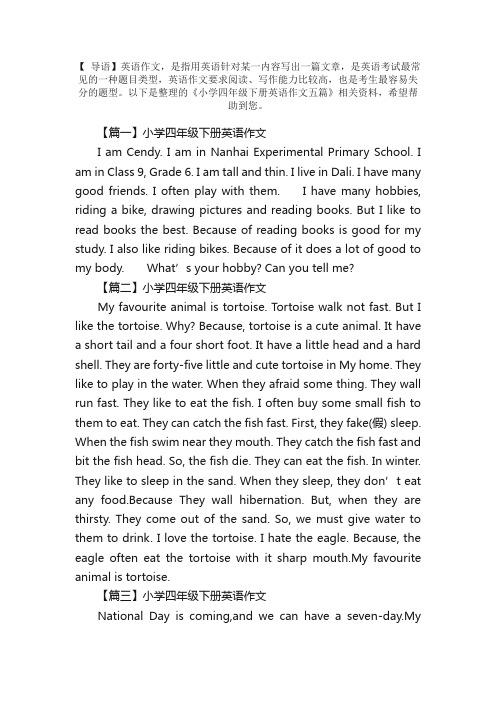
【导语】英语作文,是指用英语针对某一内容写出一篇文章,是英语考试最常见的一种题目类型,英语作文要求阅读、写作能力比较高,也是考生最容易失分的题型。
以下是整理的《小学四年级下册英语作文五篇》相关资料,希望帮助到您。
【篇一】小学四年级下册英语作文I am Cendy. I am in Nanhai Experimental Primary School. I am in Class 9, Grade 6. I am tall and thin. I live in Dali. I have many good friends. I often play with them. I have many hobbies, riding a bike, drawing pictures and reading books. But I like to read books the best. Because of reading books is good for my study. I also like riding bikes. Because of it does a lot of good to my body. What’s your hobby? Can you tell me?【篇二】小学四年级下册英语作文My favourite animal is tortoise. Tortoise walk not fast. But I like the tortoise. Why? Because, tortoise is a cute animal. It have a short tail and a four short foot. It have a little head and a hard shell. They are forty-five little and cute tortoise in My home. They like to play in the water. When they afraid some thing. They wall run fast. They like to eat the fish. I often buy some small fish to them to eat. They can catch the fish fast. First, they fake(假) sleep. When the fish swim near they mouth. They catch the fish fast and bit the fish head. So, the fish die. They can eat the fish. In winter. They like to sleep in the san d. When they sleep, they don’t eat any food.Because They wall hibernation. But, when they are thirsty. They come out of the sand. So, we must give water to them to drink. I love the tortoise. I hate the eagle. Because, the eagle often eat the tortoise with it sharp mouth.My favourite animal is tortoise.【篇三】小学四年级下册英语作文National Day is coming,and we can have a seven-day.Myfamily are going to Hainan.It's a good seaside city.We are staying there for a week. We are going to the beach and going swimming in the sea.We're visiting Tianya Haijiao,Wanquan River and many other beautiful places.I think we'll have a good time there.【篇四】小学四年级下册英语作文When the summer comes, the weather is so hot, it is rarely to see the rain. Today, when I wake up, I find the weather is chilly, it is going to rain. I am so happy, I miss the rain so much. Suddenly, the rain drops from the sky, I ran out of the house, looking at the sky, dancing with the rain. I feel so cool, then all my weariness has gone.【篇五】小学四年级下册英语作文There are seven people in my family. They are my father, my mother, my three sisters, my brother and I. Do you want to know my family's job? OK, let me tell you! My father is a doctor, and my mother is a nurse. They are work in same hospital. My father and my mother work are very hard. My three sisters, my brother and I are student. We are study very hard. We're like study, best.My father is strict with we, but we know he is very love we, and my mother she is benign with we, she is very love me, too. I am very happy, because I have a happy family.。
四年级英语下册单词表
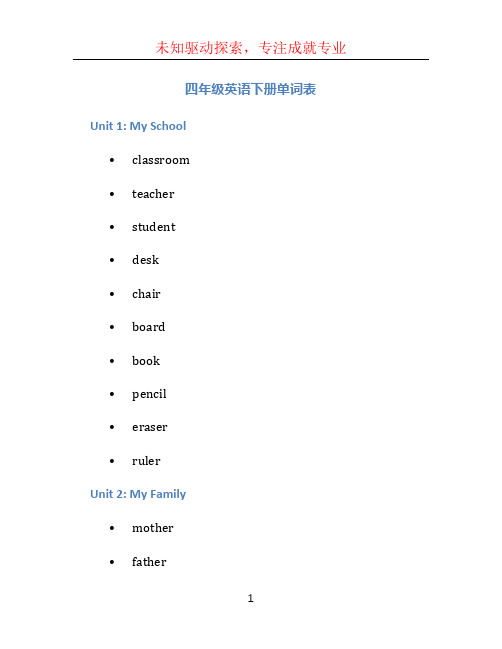
四年级英语下册单词表Unit 1: My School•classroom•teacher•student•desk•chair•board•book•pencil•eraser•rulerUnit 2: My Family•mother•father•brother•grandmother•grandfather•aunt•uncle•cousin•familyUnit 3: My House•bedroom•living room•kitchen•bathroom•garden•door•window•chair•sofaUnit 4: My Friends •friend•best friend•playmate•classmate•partner•team•share•help•listen•happy Unit 5: My Hobbies •read•sing•dance•swim•play•jump•run•sleep•eatUnit 6: My Day•morning•afternoon•evening•night•wake up•get up•brush teeth•wash face•have breakfast•go to school Unit 7: My Body•head•hair•eyes•ears•nose•mouth•neck•shoulders•arms•legsUnit 8: My Clothes •hat•shirt•pants•skirt•dress•shoes•socks•jacket•gloves•scarfUnit 9: My Food•apple•banana•orange•bread•cheese•egg•rice•chicken•vegetables Unit 10: My Pets•dog•cat•fish•bird•hamster•turtle•rabbit•guinea pig•snakeUnit 11: My City•street•park•store•school•hospital•library•museum•restaurant•zoo•beachUnit 12: My Holidays•New Year’s Day•Easter•Christmas•Thanksgiving•Halloween•birthday•vacation•party•present•fireworks以上是四年级英语下册的单词表。
人教版小学四年级英语下册知识点汇总
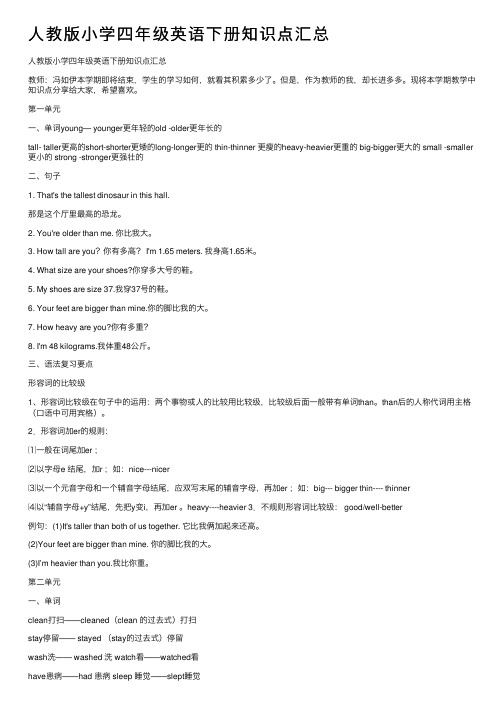
⼈教版⼩学四年级英语下册知识点汇总⼈教版⼩学四年级英语下册知识点汇总教师:冯如伊本学期即将结束,学⽣的学习如何,就看其积累多少了。
但是,作为教师的我,却长进多多。
现将本学期教学中知识点分享给⼤家,希望喜欢。
第⼀单元⼀、单词young— younger更年轻的old -older更年长的tall- taller更⾼的short-shorter更矮的long-longer更的 thin-thinner 更瘦的heavy-heavier更重的 big-bigger更⼤的 small -smaller 更⼩的 strong -stronger更强壮的⼆、句⼦1. That's the tallest dinosaur in this hall.那是这个厅⾥最⾼的恐龙。
2. You're older than me. 你⽐我⼤。
3. How tall are you?你有多⾼? I'm 1.65 meters. 我⾝⾼1.65⽶。
4. What size are your shoes?你穿多⼤号的鞋。
5. My shoes are size 37.我穿37号的鞋。
6. Your feet are bigger than mine.你的脚⽐我的⼤。
7. How heavy are you?你有多重?8. I'm 48 kilograms.我体重48公⽄。
三、语法复习要点形容词的⽐较级1、形容词⽐较级在句⼦中的运⽤:两个事物或⼈的⽐较⽤⽐较级,⽐较级后⾯⼀般带有单词than。
than后的⼈称代词⽤主格(⼝语中可⽤宾格)。
2.形容词加er的规则:⑴⼀般在词尾加er ;⑵以字母e 结尾,加r ;如:nice---nicer⑶以⼀个元⾳字母和⼀个辅⾳字母结尾,应双写末尾的辅⾳字母,再加er ;如:big--- bigger thin---- thinner⑷以“辅⾳字母+y”结尾,先把y变i,再加er 。
小学四年级英语下册单词表

小学四年级英语下册单词表1. big – adj. 大的Example: My brother has a big house.2. small – adj. 小的Example: I have a small cat.3. tall – adj. 高的Example: The tree is very tall.4. short – adj. 矮的Example: She is shorter than her friend.5. long – adj. 长的Example: This road is very long.6. short – adj. 短的Example: Can I have a short pencil, please?7. thin – adj. 瘦的Example: The girl is very thin.8. fat – adj. 胖的Example: The cat is very fat.9. light – adj. 轻的Example: This bag is light.10. heavy – adj. 重的Example: The box is too heavy for me to lift.11. fast – adj. 快的Example: The car is very fast.12. slow – adj. 慢的Example: He walks very slowly.13. old – adj. 老的Example: My grandmother is very old.14. young – adj. 年轻的Example: The baby is very young.15. new – adj. 新的Example: I got a new book for my birthday.16. good – adj. 好的Example: He is a good student.17. bad – adj. 坏的Example: The weather is bad today.18. happy – adj. 开心的Example: She is very happy to see her friends.19. sad – adj. 伤心的Example: He felt sad when his pet died.20. glad – adj. 高兴的Example: I am glad to be here.21. angry – adj. 生气的Example: She was angry when she found out the truth.22. tired – adj. 疲倦的Example: I feel tired after running a marathon.23. kind – adj. 友好的Example: She is a kind person.24. mean – adj. 刻薄的Example: The mean teacher gave us a lot of homework.25. friendly – adj. 友好的Example: My neighbor is very friendly.26. polite – adj. 有礼貌的Example: It is polite to say "please" and "thank you".27. impolite – adj. 不礼貌的Example: Interrupting someone when they are speaking is impolite.28. beautiful – adj. 美丽的Example: The sunset over the ocean is beautiful.29. ugly – adj. 丑陋的Example: That painting is really ugly.30. clean – adj. 干净的Example: The kitchen is clean now.31. dirty – adj. 脏的Example: His clothes are dirty from playing outside.32. noisy – adj. 喧闹的Example: The classroom gets very noisy during recess.33. quiet – adj. 安静的Example: Please be quiet in the library.34. expensive – adj. 昂贵的Example: This dress is too expensive for me.35. cheap – adj. 便宜的Example: I bought a cheap umbrella from the store.36. difficult – adj. 困难的Example: Math can be difficult sometimes.37. easy – adj. 容易的Example: This puzzle is easy to solve.38. interesting – adj. 有趣的Example: The movie was very interesting.39. boring – adj. 无聊的Example: The lecture was so boring that I fell asleep.40. delicious – adj. 美味的Example: The food at the restaurant was delicious.41. hungry – adj. 饿的Example: I'm hungry. Can we eat now?42. full – adj. 饱的Example: I ate so much that I'm full now.43. thirsty – adj. 渴的Example: After playing outside, I felt very thirsty.44. hot – adj. 热的Example: The weather is very hot today.45. cold – adj. 冷的Example: Can you turn on the heater? It's cold in here.46. dark – adj. 黑暗的Example: I'm scared of the dark.47. bright – adj. 明亮的Example: The sun is very bright today.48. sunny – adj. 晴朗的Example: Let's go to the beach. It's sunny outside.49. cloudy – adj. 多云的Example: It might rain today. The sky is cloudy.50. rainy – adj. 下雨的Example: Don't forget your umbrella. It's rainy outside.51. snowy – adj. 下雪的Example: I love playing in the snowy mountains.52. windy – adj. 多风的Example: The tree branches are swaying in the wind.53. spring – n. 春天Example: I love watching flowers bloom in the spring.54. summer – n. 夏天Example: I enjoy swimming at the beach in the summer.55. autumn – n. 秋天Example: The leaves change color in the autumn.56. winter – n. 冬天Example: It's very cold during the winter.57. day – n. 白天Example: I like to play soccer during the day.58. night – n. 夜晚Example: The stars come out at night.59. morning – n. 早上Example: I wake up early in the morning.60. afternoon – n. 下午Example: We have art class in the afternoon.61. evening – n. 晚上Example: We usually have dinner in the evening.62. breakfast – n. 早餐Example: I usually have cereal for breakfast.63. lunch – n. 午餐Example: My mom packed me a sandwich for lunch.64. dinner – n. 晚餐Example: We had pizza for dinner last night.65. fruit – n. 水果Example: I like to eat apples and bananas as my fruits.66. vegetable – n. 蔬菜Example: Carrots and broccoli are my favorite vegetables.67. meat – n. 肉类Example: I don't eat meat because I'm a vegetarian.68. fish – n. 鱼Example: She caught a big fish while fishing.69. bread – n. 面包Example: I like to make sandwiches with bread.70. milk – n. 牛奶Example: I drink a glass of milk every morning.71. juice – n. 果汁Example: Orange juice is my favorite drink.72. water – n. 水Example: It's important to drink enough water every day.73. tea – n. 茶Example: I like to drink herbal tea before bed.74. coffee – n. 咖啡Example: My mom drinks a cup of coffee every morning.75. cake – n. 蛋糕Example: We had chocolate cake for dessert.76. candy – n. 糖果Example: I like to eat candy on Halloween.77. cookie – n. 饼干Example: My grandma bakes the best cookies.78. ice cream – n. 冰淇淋Example: We went to the ice cream shop for a treat.79. chocolate – n. 巧克力Example: I love to eat chocolate when I'm sad.80. apple – n. 苹果Example: An apple a day keeps the doctor away.81. banana – n. 香蕉Example: I like to eat bananas for a snack.82. orange – n. 橙子Example: I like to drink orange juice in the morning.83. strawberry – n. 草莓Example: I love eating strawberries with whipped cream.84. cherry – n. 樱桃Example: We picked cherries from the tree.85. pineapple – n. 菠萝Example: I like to eat pineapple in fruit salad.86. lemon – n. 柠檬Example: Squeeze some lemon juice in your tea.87. grape – n. 葡萄Example: My favorite fruit is grapes.88. watermelon – n. 西瓜Example: We ate watermelon at the picnic.89. pear – n. 梨Example: She had a juicy and sweet pear.90. tomato – n. 番茄Example: Tomatoes are used to make ketchup.。
四年级下册英语说课稿4篇(人教版小学四年级下册英语说课稿)

四年级下册英语说课稿4篇(人教版小学四年级下册英语说课稿)本课我结合教材的重难点以及学科的特点,利用多种教学方法,在开心轻松的的气氛中进展教学,从视、听、说等方面使学生得到语言的训练,提高学生学习英语的兴趣。
一、说教材1、教材的地位及作用《Peter is writing。
》是湖南少儿版四年级下册第五单元的内容,本课重点围绕日常生活中的几个动作,以学习用现在进展时描述人们正在进展的动作为主题开展教学,通过学习句型“Someone is doing something。
”让学生能够用英语表达出某人正在做某事。
本单元是一个重点,它为第六单元的学习奠定了根底。
2、教学目标小学阶段的英语课程主要是激发学生学习英语的兴趣,培育学生对英语学习的积极态度,使他们建立学习英语的自信念,培育学生肯定的语感和良好的语音语调,为英语的进一步学习打下根底。
故此,我制定了以下的教学目标:(1)、认知目标a、把握单词:sleeping playing eating drinking cookingb、学习运用句型:“Someone is doing something。
”(2)、力量目标:学生能用英语描述人们正在做的事情。
(3)、情感目标:通过活动、嬉戏使学生产生学习英语的兴趣,让学生敢于、乐于开口,积极参加沟通。
并使学生在学习的过程中,培育他们的集体荣誉感和竞争意识。
3、教学重难点依据《英语课程标准》的要求以及本课在教材中所处的地位和作用,我确定了以下的教学重难点:教学重点:学生能听、说、读单词sleeping sweeping painting working cooking教学难点:学生能敏捷运用句型“Someone is doing something。
”二、教学方法依据以上对教材的分析,同时针对学生学习外语存在肯定困难的实际状况,我采纳了任务型教学法、直观教学法、嬉戏竞赛法。
学法有观看猜想、仿照练习和师生共同参加。
小学四年级下册英语知识点

小学四年级下册英语知识点在小学四年级的英语学习中,孩子们将继续巩固基础知识,并学习更多的词汇和语法规则。
下面将介绍小学四年级下册英语的知识点。
1. 时态:在四年级下册学习中,孩子们将学习过去时的两种形式:一般过去时和过去进行时。
一般过去时用于描述过去的事件或状态,句子的谓语动词需要使用动词的过去式形式。
过去进行时用于描述过去某一时刻正在进行的动作,句子的结构为“was/were + 动词的-ing 形式”。
2. 词汇扩展:四年级下册的英语学习中,孩子们将学习更多的词汇,包括动词、名词、形容词和副词等。
他们将学习如何正确运用这些词汇来构建句子和表达自己的意思。
3. 形容词和副词的比较级和最高级:在四年级下册的英语学习中,孩子们将学习如何构建形容词和副词的比较级和最高级。
比较级用于比较两个人或物的程度或数量,最高级用于比较三个或三个以上的人或物的程度或数量。
4. 动词的三单形式:在四年级下册英语学习中,孩子们将学习动词的三单形式。
在第三人称单数主语(he、she、it等)的句子中,动词需做出相应的变化,通常在动词末尾加上-s, -es或-ies。
5. 数词和序数词:在四年级下册英语学习中,孩子们将学习如何正确运用数词和序数词。
数词用来表达数量,序数词用来表达顺序。
6. 介词短语:在四年级下册英语学习中,孩子们将学习如何使用介词短语。
介词短语通常由介词和名词、代词或动名词构成,用于描述时间、地点、原因等。
7. 询问和回答:在四年级下册英语学习中,孩子们将学习如何正确地提问和回答问题。
他们将学习使用疑问词如what, where, when, why, who等以及一般疑问句的结构。
8. 简单对话和口头表达:在四年级下册英语学习中,孩子们将学习如何进行简单的对话和口头表达。
通过练习日常对话,他们将提高自己的口语表达能力。
以上是小学四年级下册英语的一些知识点。
通过系统地学习这些知识点,孩子们将在英语学习中取得更大的进步,并能够更自信地运用英语进行交流和表达。
小学四年级英语下册重点知识点人教版
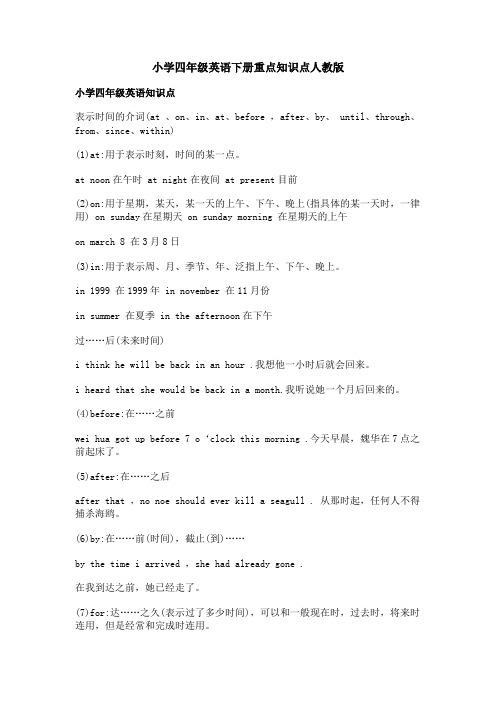
小学四年级英语下册重点知识点人教版小学四年级英语知识点表示时间的介词(at 、on、in、at、before ,after、by、 until、through、from、since、within)(1)at:用于表示时刻,时间的某一点。
at noon在午时 at night在夜间 at present目前(2)on:用于星期,某天,某一天的上午、下午、晚上(指具体的某一天时,一律用) on sunday在星期天 on sunday morning 在星期天的上午on march 8 在3月8日(3)in:用于表示周、月、季节、年、泛指上午、下午、晚上。
in 1999 在1999年 in november 在11月份in summer 在夏季 in the afternoon在下午过……后(未来时间)i think he will be back in an hour .我想他一小时后就会回来。
i heard that she would be back in a month.我听说她一个月后回来的。
(4)before:在……之前wei hua got up before 7 o‘clock this morning .今天早晨,魏华在7点之前起床了。
(5)after:在……之后after that ,no noe should ever kill a seagull . 从那时起,任何人不得捕杀海鸥。
(6)by:在……前(时间),截止(到)……by the time i arrived ,she had already gone .在我到达之前,她已经走了。
(7)for:达……之久(表示过了多少时间),可以和一般现在时,过去时,将来时连用,但是经常和完成时连用。
florence often worked for twenty-four hours without rest .弗洛沦斯常常工作24小时而不休息。
(完整版)人教版小学英语四年级下册单词表
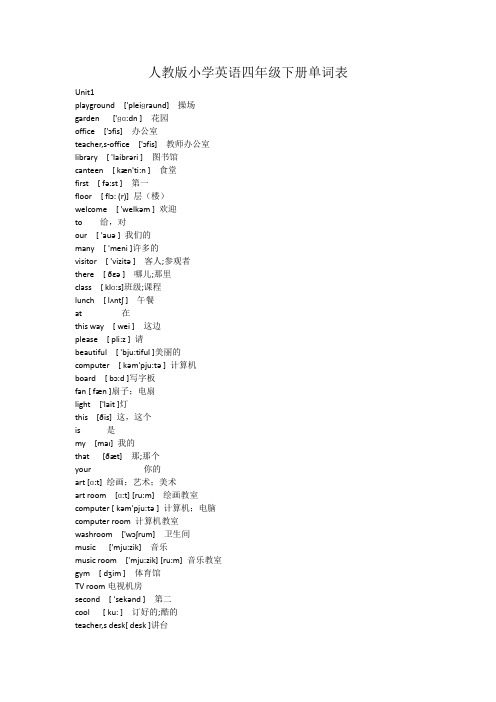
人教版小学英语四年级下册单词表Unit1playground ['pleiɡraund] 操场garden ['ɡɑ:dn ] 花园office ['ɔfis] 办公室teacher,s-office ['ɔfis] 教师办公室library [ 'laibrəri ] 图书馆canteen [ kæn'ti:n ] 食堂first [ fə:st ] 第一floor [ flɔ: (r)] 层(楼)welcome [ 'welkəm ] 欢迎to 给,对our [ 'auə ] 我们的many [ 'meni ]许多的visitor [ 'vizitə ] 客人;参观者there [ ðεə ] 哪儿;那里class [ klɑ:s]班级;课程lunch [ lʌntʃ ] 午餐at 在this way [ wei ] 这边please [ pli:z ] 请beautiful [ 'bju:tiful ]美丽的computer [ kəm'pju:tə ] 计算机board [ bɔ:d ]写字板fan [ fæn ]扇子;电扇light ['lait ]灯this [ðis] 这,这个is 是my [maɪ] 我的that [ðæt] 那;那个your 你的art [ɑ:t] 绘画;艺术;美术art room [ɑ:t] [ru:m] 绘画教室computer [ kəm'pju:tə ] 计算机;电脑computer room 计算机教室washroom ['wɔʃrum] 卫生间music ['mju:zik] 音乐music room ['mju:zik] [ru:m] 音乐教室gym [ dʒim ] 体育馆TV room电视机房second [ 'sekənd ] 第二cool [ ku: ] 订好的;酷的teacher,s desk[ desk ]讲台picture[ 'piktʃə ]图画.wall[ wɔ:l ]墙floor[ flɔ: ] 地板yes [ jes ] 是的it [ it ] 它Unit2English [ 'iŋgliʃ ]英语;英文English class英语课class [ klɑ:s ] 课music class [ klɑ:s ] 音乐课P.E. class体育课breakfast [ 'brekfəst ] 早餐dinner [ 'dinə ] 晚餐;正餐.over [ 'əuvə ] 结束go [ gəu ]去go to the playground [ 'pleiɡraund ]去操场go home [ həum ] 回家now[ nau ]现在just a minute ['minit] 再多一会kid [ kid ] 小孩;孩子run [ rʌn ] 跑one[ wʌn ]一two[ tu: ] 二three [ θri: ]三four [ fɔ: ]四five[ faiv ]五six[ siks ] 六.seven[ 'sevən ]七eight[ eit ] 八.nine[ nain ] 九.ten[ ten ]十what[ wɔt]什么time [taɪm] 时间it’s = it iso’clock [ə’klɔk] ……点钟get [ ɡet ] 得到获得get up [ ɡet ] [ ʌp ] 起床go to school [sku:l] 上学go home 回家go to bed上床睡觉ready [ 'redi ] 准备好的hurry [ 'hʌri ] 抓紧;赶快math [ mæθ] 数学Chinese ['tʃai'ni:z] n 语文,汉语;中国人adj中国的,中国人的;中国话的china ['tʃainə] n 中国;瓷器English [ 'iŋgliʃ ] a英国的;英国人的;英语的n英语;英国人England ['iŋglənd] n英格兰;英国P.E.体育music [ 'mju:zik ] 音乐for [ fɔ ] 为;给class [ klɑ:s] 班级;课程Unit3jacket [ 'dʒækit ] 夹克衫shirt [ ʃə:t ] 衬衫skirt [ skə:t ] 裙子dress [ dres ] 连衣裙sweater [ 'swetə ] 毛衣T-shirt T恤衫whose [ hu:z ] 谁的red [ red ] 红色的blue [ blu: ] 蓝色的yellow [ 'jeləu ] 黄色的green [ ɡri:n ] 绿色的green beans [gri:n][bi:ns] 绿豆white [ hwait ] 白色的no [nəu] 不;不是not [ nɔt ] 不;不是的jeans [dʒi:nz] 牛仔裤pants [ pænts ] 长裤parents ['pɛərənts] 父母亲socks [sɔks] 袜子shoes [ʃuːz] 鞋子shorts [ʃɔ:ts] 短裤these [ ði:z ] 这些so [ 'səu] 如此;那样they’re = they arethose [ ðəuz ] 那些but [ bʌt ] 但是what for [ wɔt ] 为什么neighbour [ 'neibə ] 邻居colour [ 'kʌlə ] 颜色Unit4warm [ wɔ:m ] 暖和的cold [ kəuld ] 寒冷的cool [ ku:l ] 凉爽的;酷的hot [ hɔt ] 炎热的weather [ 'weðə ] 天气weather report [ ri'pɔ:t ] 天气预报wear [ wεə ] v. 穿today [tə'dei ] 今天can’t = can notput on穿上put on 动词,表示穿上衣服的动词,强调动作./例: I get up and put on my coatwear 动词,表示穿上衣服的动作,也可表示穿着衣服的状态,强调状态./例: Today, he wears a red hatjeans [dʒi:nz] 牛仔裤pants [ pænts ] 长裤socks [sɔks] 袜子shoes [ʃuːz] 鞋子let’s = let usplay [ plei ] 玩,踢football ['futbɔ:l] 足球rainy [ 'reini ] 下雨的rain [ rein ] n雨vi下雨snowy [ 'snəui ] 下雪的snow [ snəu ] n雪;vi下雪now [ nau ] 现在windy [ 'windi ] 有风的wind [ wind ] n风cloudy [ 'klaudi ] 多云的cloud [ klaud ] 云sunny [ 'sʌni ] 晴朗的sun [ sʌn ] 太阳hello [hə'ləu] 喂,你好(打电话用语)hi [ hai ] 喂,你not much [ mʌtʃ ] 没什么New York纽约matter [ 'mætə ] 事情;麻烦have to必须;不得不close [ kləuz ] 关;关上bye [ bai ] 再见(口语)Unit5colourful ['kʌləful ] 色彩丰富的pretty [ 'priti ] 漂亮的;可爱的cheap [ tʃi:p ] 便宜的expensive [iks'pensiv] 昂贵的sixty [ 'siksti(:) ] 六十seventy [ 'sevənti ] 七十hundred [ 'hʌndrəd ] 百assistant [ə'sistənt ] 售货员help [help] 帮助how much多少钱ninety-nine [ 'nainti ] 九十九that’s = that isbig [ biɡ] 大的small [ smɔ:l ] 小的long [ lɔŋ ] 长的short [ ʃɔ:t ] 短的;矮的sneakers ['sni:kəz] 胶底帆布鞋;网球鞋slippers ['slipə] 拖鞋sandals ['sandl] 凉鞋boots [ bu:ts ] 靴子want [ wɔnt ] 想要pair [ pεə ] 一双;一对a pair of一双for for [fɔ: (r)] [ fɔ(r)] 为;给son [ sʌn ] 儿子sun [ sʌn ] 太阳size [ saiz ] 尺码all right[ ɔ:l ] [ rait ]好吧;好的we’ll=we willtake [ teik ] 买them [ ðem ] 它(他、她)们apple [ 'æpl ] 苹果banana[ bə'nɑ:nə ] 香蕉pear [pe ə(r) ] 梨Orange [ 'ɔrindʒ] 橙子watermelon ['wɔ:təmelən] 西瓜are [ɑ:(r)] 是they [ ðei ] pron. 他(她,它)们Unit6sheep [ ʃip ] 绵羊horse [ hɔ:s ] 马hen [ hen ] 母鸡lamb [ læm ] 小羊;羔羊goat [ ɡəut ] 山羊cow [ kau ] 奶牛farm [ fɑ:m ] . n. 农场,农田farmer ['fɑ:mə] n. 农夫,农民aren’t =are notdonkey [ 'dɔŋki ] 驴子key [ ki: ] 钥匙fat [ fæt ] 胖的cat ['kæt ] 猫rabbit [ 'ræbit ] 兔子pig [ piɡ] 猪duck [ dʌk ] 鸭子dog [dɔɡ] 狗tomoto [ tə'ma:təu] 西红柿cucumber [ 'kju:kʌmbə ] 黄瓜potato [ pə'teitəu ] 土豆onion [ 'ʌnjən ] 洋葱carrot [ 'kærət ] 胡萝卜fresh [ freʃ ] 新鲜的eleven [ i'levən ] 十一twelve [ twelv ] 十二thirteen [ 'θə:'ti:n ] 十三fifteen [ 'fifti:n ] 十五twenty [ 'twenti ] 二十how many 多少how much 多少there [ ðεə ] 那儿;那里there be(一)单元音(12个)1、/i:/ me he see tea2、/ I / it big ship3、/e/ bed let friend4、/æ/ cat and apple5、/ɑ:/ car farm garden6、/ɔ/ on hot want7、/ə:/ her birthday8、/ə / ago teacher doctor9、/u:/ zoo ruler cool10、/u / foot good book11、/ɔ:/ water short door12、/ ɔ / dog what talk(二)双元音(8个)1、/ ei / day eight great2、/ ai / hi my bye like3、/ ɔi / boy toy4、/ əu / no boat know5、/ au / out now brown6、/ iə / ear deer near7、/εə / bear there8、/ uə / sure poor/θ/thirteen 十三[ˌθə:ˈti:n]thank 谢谢[ θæŋk]/ð/mother 母亲[ˈmʌðə]father 父亲[ˈfɑ:ðə]。
最新版四年级英语下册知识点总结
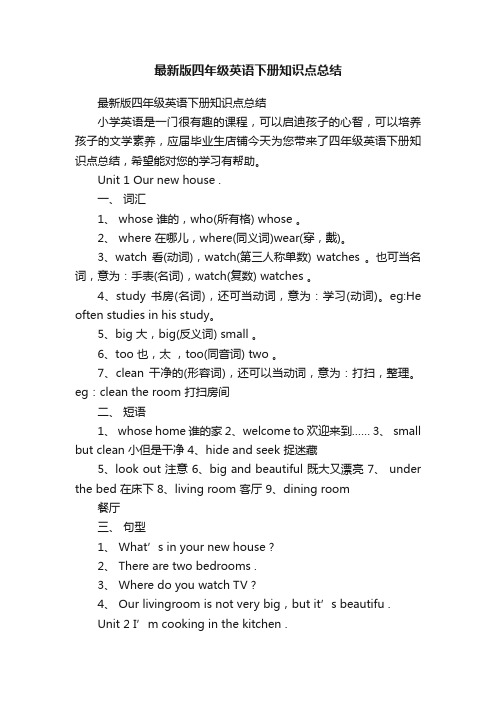
最新版四年级英语下册知识点总结最新版四年级英语下册知识点总结小学英语是一门很有趣的课程,可以启迪孩子的心智,可以培养孩子的文学素养,应届毕业生店铺今天为您带来了四年级英语下册知识点总结,希望能对您的学习有帮助。
Unit 1 Our new house .一、词汇1、 whose 谁的,who(所有格) whose 。
2、 where 在哪儿,where(同义词)wear(穿,戴)。
3、watch 看(动词),watch(第三人称单数) watches 。
也可当名词,意为:手表(名词),watch(复数) watches 。
4、study 书房(名词),还可当动词,意为:学习(动词)。
eg:He often studies in his study。
5、big 大,big(反义词) small 。
6、too 也,太,too(同音词) two 。
7、clean 干净的(形容词),还可以当动词,意为:打扫,整理。
eg:clean the room 打扫房间二、短语1、 whose home 谁的家2、welcome to 欢迎来到……3、 small but clean 小但是干净4、hide and seek 捉迷藏5、look out 注意6、big and beautiful 既大又漂亮7、 under the bed 在床下8、living room 客厅9、dining room餐厅三、句型1、What’s in your new house ?2、 There are two bedrooms .3、 Where do you watch TV ?4、 Our livingroom is not very big,but it’s beautifu .Unit 2 I’m cooking in the kitchen .1、run (现在分词) running2、swim (现在分词) swimming3、sit (现在分词) sitting4、make (现在分词) making5、have (现在分词) having6、write (现在分词) writing7、dance (现在分词) dancing8、cook 做饭(动词),也可当名词讲,意为:厨师。
人教版小学四年级英语下册知识点归纳

人教版小学四年级英语下册知识点归纳人教版(PEP)小学四年级英语下册知识点归纳Unit 1一、词汇first floor一楼second floor二楼teachers’office教师办公室library图书馆playground操场computer room计算机房art room美术教室music room音乐教室next to紧邻;在……近旁homework作业class班;班级forty四十way方向二、句子1. Look! That’s the playground.看!那是操场。
2. Where’s the library?藏书楼在那里?It’s next to the art room.它紧邻美术教师。
3. Is this the teachers’office?这是教师办公室吗?No, it isn’t. It’s the computer room.不,它不是。
它是计算机房。
4. Do you have an art room?你们有美术课堂吗?-Yes. It’s on the second floor.是的。
它在二楼。
5. Where’s the teachers’office?教师办公室在那里?It’s on the second floor.它在二楼。
6. Excuse me.打扰一下。
7. The teachers’office is next to the library.教师办公室紧邻图书馆。
8. Here’s my homework.这是我的作业。
9. Welcome to our school! This is my classroom.欢送来到我们的黉舍!这是我的课堂。
10. How many students are there in your class?你们班里有几何逻辑学生?Forty-five students.四十五名学生。
11. Do you have a library?你们(黉舍)有藏书楼吗?-- Yes, we do.是的,我们有。
人教版小学四年级英语下册课文及翻译

⼈教版⼩学四年级英语下册课⽂及翻译四年级英语下册课⽂及翻译Unit One My school 第⼀单元我的学校Look!That’s the playground.看!那是操场.Where’s the library?.图书馆在哪⼉?It’s next to the art room. 它在美术室的旁边。
Oh,No!That’s my library! 哦!不!那是我的图书馆!Is this the teachers’ office?这是⽼师的办公室吗?.No,it isn’t.It’s the computer room. 不,它不是。
它是电脑室.Do you have an art room? 你们有美术室吗?Yes.It’s on the second floor. 有的,它在⼆楼。
Let's talk 让我们来对话吧Excuse me .Where’s the teachers’ office?对不起,⽼师的办公室在哪⼉? It’s on the second floor. 它在⼆楼。
Ok.Thanks. 谢谢!Hi,Is this the teachers’ office? 嗨!这是⽼师的办公室吗?No,it isn’t.The teachers’ office is next to the library.不,不是的。
⽼师的办公室在图书馆旁边。
Hi,Miss White!Here’s my homework.你好,怀特⼩姐!这是我的家庭作业。
Thank you, Mike.谢谢你,麦克。
Bye,Miss White.再见,怀特⼩姐。
Look,ask and answerWhere’s the library? 图书馆在哪⾥?It’s on the second flo or. 它在⼆楼。
Is it next to classroom 3? 它是在三班的旁边吗?Yes,it is. 是的。
人教版小学四年级下册英语课文及翻译
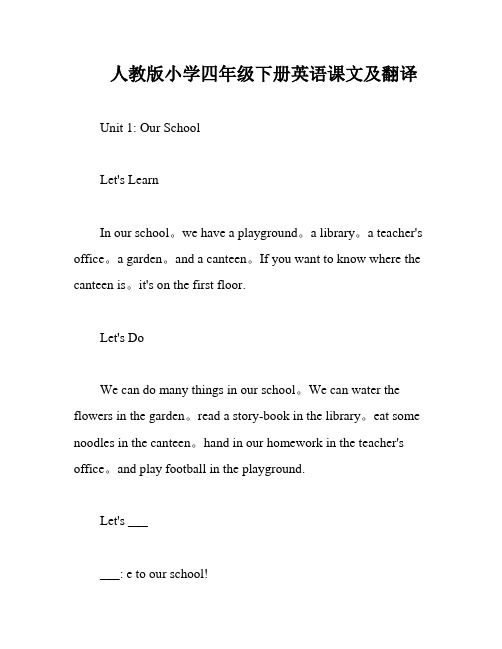
人教版小学四年级下册英语课文及翻译Unit 1: Our SchoolLet's LearnIn our school。
we have a playground。
a library。
a teacher's office。
a garden。
and a canteen。
If you want to know where the canteen is。
it's on the first floor.Let's DoWe can do many things in our school。
We can water the flowers in the garden。
read a story-book in the library。
eat some noodles in the canteen。
hand in our homework in the teacher's office。
and play football in the playground.Let's ______: e to our school!Visitor: Hi。
thanks for having me。
This is a nice school.___: Thank you。
This is the teacher's office。
and that is my classroom。
We have 45 students in our class.Visitor: Do you have a library?___: Yes。
we do。
It's a great place to read books.Visitor: Do you have lunch at school?___: Yes。
we do。
Our canteen is on the first floor。
四年级下册英语书人教版单词表
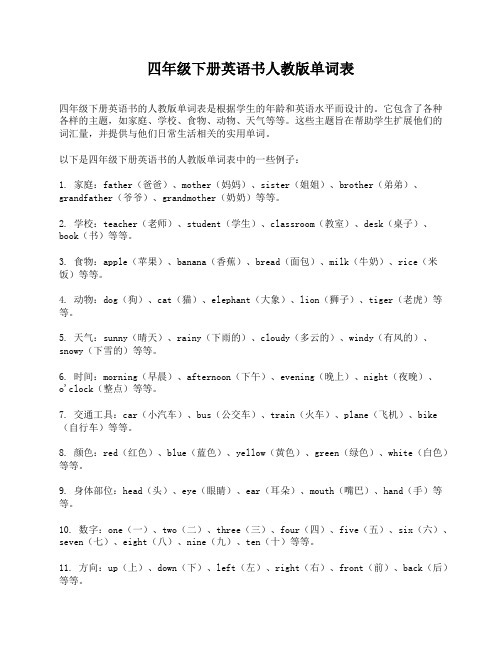
四年级下册英语书人教版单词表四年级下册英语书的人教版单词表是根据学生的年龄和英语水平而设计的。
它包含了各种各样的主题,如家庭、学校、食物、动物、天气等等。
这些主题旨在帮助学生扩展他们的词汇量,并提供与他们日常生活相关的实用单词。
以下是四年级下册英语书的人教版单词表中的一些例子:1. 家庭:father(爸爸)、mother(妈妈)、sister(姐姐)、brother(弟弟)、grandfather(爷爷)、grandmother(奶奶)等等。
2. 学校:teacher(老师)、student(学生)、classroom(教室)、desk(桌子)、book(书)等等。
3. 食物:apple(苹果)、banana(香蕉)、bread(面包)、milk(牛奶)、rice(米饭)等等。
4. 动物:dog(狗)、cat(猫)、elephant(大象)、lion(狮子)、tiger(老虎)等等。
5. 天气:sunny(晴天)、rainy(下雨的)、cloudy(多云的)、windy(有风的)、snowy(下雪的)等等。
6. 时间:morning(早晨)、afternoon(下午)、evening(晚上)、night(夜晚)、o'clock(整点)等等。
7. 交通工具:car(小汽车)、bus(公交车)、train(火车)、plane(飞机)、bike (自行车)等等。
8. 颜色:red(红色)、blue(蓝色)、yellow(黄色)、green(绿色)、white(白色)等等。
9. 身体部位:head(头)、eye(眼睛)、ear(耳朵)、mouth(嘴巴)、hand(手)等等。
10. 数字:one(一)、two(二)、three(三)、four(四)、five(五)、six(六)、seven(七)、eight(八)、nine(九)、ten(十)等等。
11. 方向:up(上)、down(下)、left(左)、right(右)、front(前)、back(后)等等。
外研社小学英语一年级起点四年级下册 知识点汇总
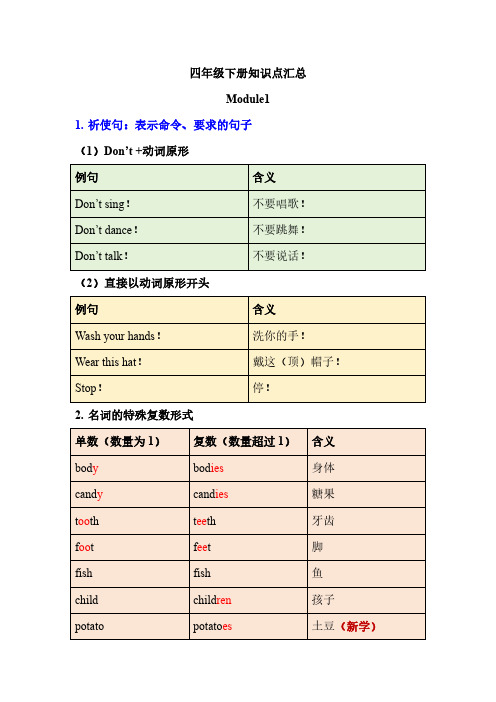
四年级下册知识点汇总Module11.祈使句:表示命令、要求的句子(1)Don’t+动词原形(2)直接以动词原形开头2.名词的特殊复数形式3.this和these的区别Module21.重点句型1—Is It....?—肯定回答:Yes,it is.否定回答:No,it isn’t.(isn’t=is not)举例:(1)—Is it expensive?它贵吗?—No,it isn’t.不,它不贵。
(2)—Is it big?它大吗?—Yes,it is.是的,它大。
(3)—Is it a pen?它是一只钢笔吗?—Yes,it is.是的,它是。
2.重点句型2—What colour is it?它是什么颜色?—It’s pink/blue/yellow/其他颜色.它是粉色/蓝色/黄色/其他颜色。
3.重点句型3It/某一件物品costs+数字+yuan.它/某一件物品花了多少元。
举例:It costs one hundred and eight yuan.它花了108元。
It costs30yuan.它花了30元。
This pen costs nineteen yuan.这只钢笔花了19元。
This pen costs one yuan.这只钢笔花了1元。
This bag costs one hundred and thirty yuan.这个书包花了130元。
Module3动词过去式相关的语法1.肯定句:动词过去式Chinese people invented paper.中国人发明了纸。
We went to the Great Wall.我们去了长城。
Ma Liang helped people.马良帮助了人们。
观察上面肯定句,invented、went、helped是动词过去式练习:把括号内的动词以正确的形式填写在横线上①She__________(come up)at school last week.②Sam______(learn)Chinese yesterday.③Lingling______(look after)her grandma last Sunday.④“Help,help!”,this boy_____(shout)yesterday.⑤“You naughty pig.”,this girl______(laugh)yesterday.2.否定句(1)否定句:didn’t+动词原形Chinese people didn’t invent bikes.中国人没有发明自行车。
- 1、下载文档前请自行甄别文档内容的完整性,平台不提供额外的编辑、内容补充、找答案等附加服务。
- 2、"仅部分预览"的文档,不可在线预览部分如存在完整性等问题,可反馈申请退款(可完整预览的文档不适用该条件!)。
- 3、如文档侵犯您的权益,请联系客服反馈,我们会尽快为您处理(人工客服工作时间:9:00-18:30)。
小学英语四年级下册(PEP)
Unit 1 My classroom
1、教师事先根据本学校的场所位置画一幅平面图(简图),但不标出场所的名称。
把平面图复印若干份(做活动时每小组一份)。
2、把单词school,playground,classroom,office,art room,music room,multimedia room,library,language lab做成约2cmx3cm的小卡片(若干套)。
做活动时每小组一套。
3、借助图片向学生呈现下列单词:school,playground,classroom,office, art room, music room,multimedia room,library,language lab。
要求学生做到:(1)看见图片能说出单词;(2)给出单词也能说出场
所名称,只要求学生能认读,不要求拼写。
4、将学生分为4一5人一组(小组成员必须围成一圈)。
每组发一张学校平面图和一套单词小卡片。
要求学生根据学校场所的实际位置把单词贴在平面图上。
5、让相邻的两个小组对比他们贴好的平面图。
如有不同之处,学生自己讨论为什么出现不同之处,并进行适当的修正。
6、把全班学生分成三个大组(队)。
在黑板上贴三幅平面图。
给每个大组再发一套单词卡片。
每个大组派两个人到前面,把卡片贴到平面图上。
首先完成且贴得正确的大组获胜。
7、小组内学生轮流根据贴好的平面图向其他学生介绍自己学校的场所(如:This is theplayground.)。
鼓励学生使用其他所学语言进行创造性表达,如It is small,but I like it.
8、把学生贴好的平面图贴在班级的墙报上,或者贴在学校的布告栏或校门入口处,当作本校场所位置的英文示意图。
9、对程度较好的学生,可以让他们自己设计一个所教学校的平面图,并用英语向他人作介绍。
评述;此项活动结合学生所在学校的实际情况,通过比较真实的任务(贴卡片),帮助学生学习语言和运用语言,并开展合作学习。
